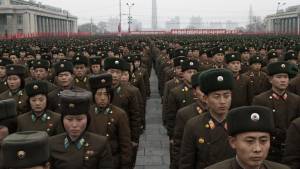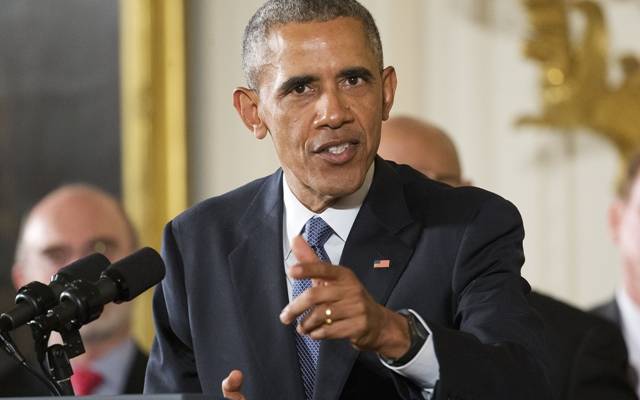
North Korean military forces attend a rally at Kim Il Sung Square in Pyongyang, North Korea, in February. (AP/Jon Chol Jin)
The world’s failure to contend with North Korea’s nuclear program will result in its having to deal with a similar Iranian threat, a Saudi writer warns.
Reports that North Korea has tested a hydrogen bomb has exacerbated tensions surrounding the nuclear deal signed between the Islamic Republic and the P5+1 Powers, as Israel and Arab countries in the Middle East which are threatened by Iran fear that the outcome in North Korea will be the same with Tehran’s nuclear aspirations.
The Saudi daily Al-Riyadh published an editorial on Thursday titled “Iran Following in the Footsteps of North Korea,” which harshly criticized the superpowers’ inadequate response to North Korea’s confrontational nuclear policy, saying Iran would follow suit after North Korea and become a global nuclear menace.
The daily expressed fear that Iran would draw its conclusions by the world’s failure to contend with North Korea’s belligerence and would progress with its nuclear weapons program, placing the Gulf States in a situation similar to that of South Korea.
The article cites the close relations shared between Tehran and Pyongyang and their close collaboration.
“As regimes that are similar to each other, Tehran and Pyongyang have found many points in common: Both are hostile to the West, both are highly controversial in their [respective geographic] regions, and both repeatedly do damage to their neighbors,” the Saudi publication wrote, according to a translation by the Middle East Media Research Institute (MEMRI).
“Both countries have a long history of cooperation that arouses concern, in nuclear and missile [technology]. According to reports, North Korean nuclear technicians have regularly visited [Iran] in order to provide their Iranian counterparts with the necessary guidance and technical supplies.”
The writer says that North Korea’s recent test “is a grave development in terms of international and regional security. Indeed, the superpowers did not hide their displeasure at this test – [a test] that constitutes a clear example of what can happen [when the superpowers] rely on promises made by regimes that show hostility and endanger regional and world security. One outcome of this is that a regime of this sort [manages to] violate the global order and upset the regional balance of power. The implications of this are magnified when the regime in question is failed and tyrannical to the point of insanity.”
The writer expresses his fear that “[the likelihood] that this model will recur in our Middle Eastern region is great, because Iran is not all that different from North Korea, and because the superpowers are repeating the same mistake and following the same methods to [attempt to] resolve the [Iranian] nuclear dossier.”
Just as the US signed a nuclear accord with North Korea, which was violated and not enforced by the US, we can expect a similar scenario with Iran
“North Korea lied when it signed the framework agreement with the US, since it was [at the same time] secretly enriching uranium. After this was exposed, it expelled the [UN] inspectors and detonated its nuclear bomb. This scenario can recur with the regime in Tehran, which can neither be trusted nor relied upon, especially because it continues to act aggressively against its neighbors. The Western countries, led by the US, will find themselves condemning a theocratic regime that calls for their downfall and yearns for their death, while the Gulf States will face a fate similar to that of South Korea, becoming hostages of American protection.”
“Will anyone learn this lesson?” the piece concludes.
Last week, a US State Department spokesman stated that the Obama administration was still undecided on how, if at all, to respond to Iran’s recent missile tests, which were breaches of UN resolutions.
In the meantime, Iran unveiled a second massive missile silo on Tuesday, which, according to the Iranians, was one of many.
Similarly, the Iranian Revolutionary Guards Corps (IRGC) announced last week that its operational units have been supplied with large numbers of the new long-range Fateh-13 precision missiles.
By: United with Israel Staff
